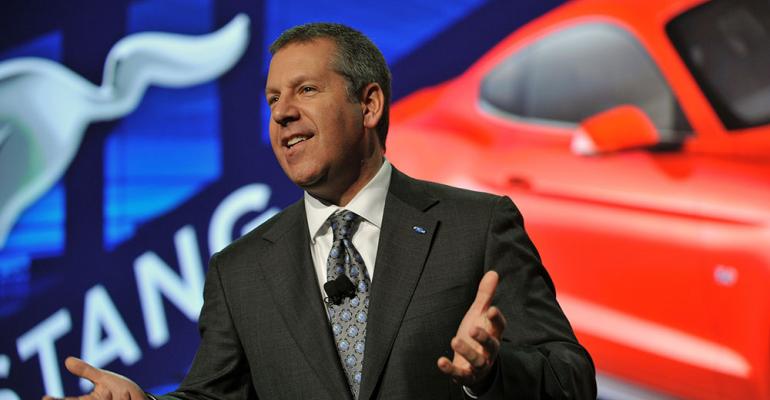CHICAGO – The world-trade playing field still isn't level, according to Joe Hinrichs, executive vice president and president of the Americas for Ford.
He tells a meeting of the Economic Club of Chicago that the auto industry is the No.1 exporter of goods outside the U.S., and while the global landscape is as competitive as ever, trade agreements are needed to ensure fair, as well as free, trade.
"Trade agreements have played an important part in the continuing transformation of the global marketplace,” Hinrichs says at a luncheon held in conjunction with the Chicago Auto Show. “The right environment for trade depends on the negotiation and enforcement of high-standard, 21st century trade agreements.
“The model for several of the trade agreements that are now under discussion is, of course, NAFTA,” the North American Free Trade Agreement.
Hinrich says “promising” negotiations over future world trade are taking place, including the Transatlantic Trade and Investment Partnership, an agreement that would strengthen trade between the U.S. and Europe.
“Another potentially huge opportunity can be seen in the Trans-Pacific Partnership, a trade negotiation now involving 12 countries, including the U.S., Japan, Canada, Mexico, Australia, Peru and Malaysia. The membership would account for 40% of global (gross domestic product).
“TPP has incredible potential. But it has to be the right agreement.”
The problem, Hinrichs says, is that the TPP won’t generate net benefits for American manufacturers if it doesn’t address currency manipulation, what he calls “the real elephant in the room.
“We need to make sure that it's not ignored, and (it) must be addressed in any future U.S. trade agreements,” he says, in reopening a wound that U.S. automakers have insisted for years needs to be healed for fair trade.
“The difference now,” Hinrichs says in an interview after the speech, “is that 60 Senators and half of the House have asked the President to address the issue, so it is becoming a bigger issue."
U.S. automakers long have argued Japan has manipulated its currency in order to gain unfair advantages in the global marketplace and to protect its home market. Estimates are that currency manipulation results in a $2,000 per vehicle exported profit for Japanese automakers.
Hinrich says Japan has managed to maintain a one-way relationship in automotive trade and despite zero tariffs, “94% of all vehicles sold in Japan are made in Japan by Japanese companies.
“Ford will urge Congress to oppose a TPP agreement if it does not include strong and enforceable currency disciplines. We simply want to see a real enforcement mechanism put in place. The TPP is likely to serve as a model for future agreements with other Asian markets. So we have to get the template right.”





